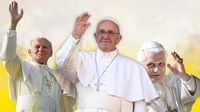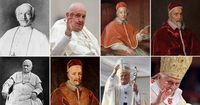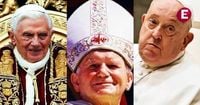On April 21, 2025, the world mourned the passing of Pope Francis, the first Latin American pope, who died at the age of 88. His tenure, which began on March 13, 2013, was marked by significant efforts to reform the Catholic Church and address pressing global issues such as social justice and environmental protection. His death marks the end of a transformative era for the Catholic Church and its followers worldwide.
Pope Francis, born Jorge Mario Bergoglio in Buenos Aires on December 17, 1936, was known for his inclusive approach and emphasis on mercy. His papacy was characterized by a commitment to addressing the needs of the marginalized and advocating for the environment, as exemplified in his 2015 encyclical, Laudato Si’, which called for urgent action on climate change.
Throughout his leadership, Pope Francis sought to bridge the gap between the Church and contemporary societal issues. His statements often resonated with those advocating for the rights of migrants and the poor. He was a vocal critic of capitalism's excesses, urging the Church to stand alongside those who are often forgotten by society.
As one of the most influential figures globally, Pope Francis's impact extended beyond religious circles; he was a prominent voice in international diplomacy, often intervening in conflicts and promoting peace. His ability to connect with people from diverse backgrounds made him a beloved figure, not only among Catholics but also among many non-Catholics.
The history of the papacy is rich and complex, with a total of 266 popes recognized officially by the Catholic Church since its inception. Each pope has left a unique mark on the Church, navigating various social, political, and theological challenges. The legacy of Pope Francis will be remembered alongside those of his predecessors, including notable figures such as Pope John Paul II and Pope Benedict XVI.
Historically, popes have played crucial roles in shaping the Church's direction and responding to societal changes. For example, Pope John Paul II, who served from 1978 until his death in 2005, was instrumental in the fall of communism in Eastern Europe and was known for his extensive travels and outreach efforts.
Pope Benedict XVI, who served from 2005 until his resignation in 2013, was recognized for his conservative stance on doctrine and liturgy. His resignation was a significant moment in Church history, as he became the first pope to step down in nearly 600 years, citing a lack of physical and mental strength due to his advanced age.
The papacy is not only a religious office but also a position of significant political influence. Throughout history, popes have faced crises and controversies, such as the Western Schism during the Middle Ages, when rival popes claimed authority, leading to a divided Church.
In addition to the political implications, the papacy has also been marked by personal challenges faced by the popes themselves. For instance, Pope Leo XIII, who served from 1878 to 1903, was known for his efforts to address the social issues arising from the Industrial Revolution. His encyclical, Rerum Novarum, laid the groundwork for Catholic social teaching, advocating for workers' rights and social justice.
Among the longest-serving popes in history, Pope Pius IX holds the record for the longest pontificate, which lasted for over 31 years, from 1846 to 1878. His tenure was marked by significant developments, including the declaration of the dogma of the Immaculate Conception and the convening of the First Vatican Council.
Other notable popes include Pope Clement XII, who served from 1730 to 1740 and was known for his patronage of the arts, and Pope Innocent XII, who focused on reforming the Church's practices, particularly in addressing nepotism.
Pope Francis's passing has prompted reflections on his contributions and the future direction of the Catholic Church. His efforts to modernize the Church and address contemporary issues have set a precedent for his successors. The Vatican has announced that preparations for his funeral are underway, with many expected to pay their respects.
As the Church prepares for the conclave to elect the next pope, many are left wondering what direction the new leader will take. Will they continue the progressive path set by Pope Francis, or will they revert to more traditional approaches? The answer remains uncertain, but the legacy of Pope Francis will undoubtedly influence the Church's future.
The Vatican has stated that the funeral will be held in accordance with traditional rites, reflecting the significance of Pope Francis's role in the Church and the global community. His influence on interfaith dialogue, social justice, and environmental advocacy will be remembered as hallmarks of his papacy.
In the days following his death, various world leaders and religious figures have expressed their condolences and paid tribute to Pope Francis. His commitment to peace and justice resonated deeply with many, and his absence will be felt across the globe.
As we reflect on the life and legacy of Pope Francis, it is clear that he was more than just a religious leader; he was a beacon of hope and a voice for the voiceless. His contributions to the Catholic Church and the world will continue to inspire future generations.






